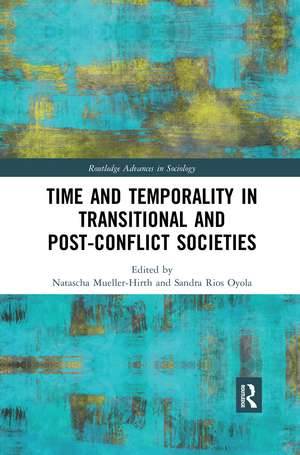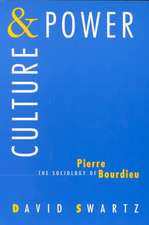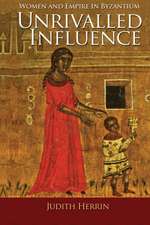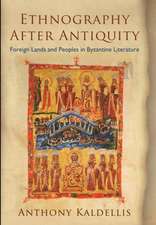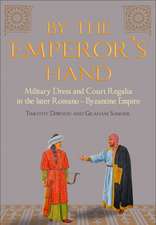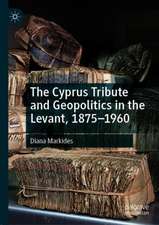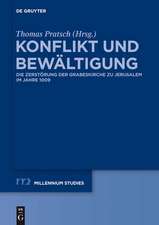Time and Temporality in Transitional and Post-Conflict Societies: Routledge Advances in Sociology
Autor Natascha Mueller-Hirth, Sandra Rios Oyolaen Limba Engleză Paperback – 14 ian 2020
Implicit conceptions of time associated with progress and linearity have influenced scholars and practitioners in the fields of transitional justice and peacebuilding, but time and temporality have rarely been systematically considered.
Time and Temporality in Transitional and Post-Conflict Societies examines how time is experienced, constructed and used in transitional and post-conflict societies. This collection critically questions linear, transitional justice time and highlights the different temporalities that exist at local and institutional levels through original empirical research.
Presenting empirical and often ethnographic research from Argentina, Brazil, Colombia, Cambodia, Mozambique, Palestine/Israel, Rwanda and South Africa, contributors use a temporal lens to investigate key issues including: transitional justice institutions, peace processes, victimhood, perpetrators, accountability, reparations, forgiveness, reconciliation and memoralisation.
This timely monograph will appeal to undergraduate and postgraduate students, as well as postdoctoral researchers, interested in fields such as political science, international relations, anthropology, transitional justice and conflict resolution. It will also be relevant to conflict resolution and peacebuilding practitioners.
| Toate formatele și edițiile | Preț | Express |
|---|---|---|
| Paperback (1) | 389.38 lei 6-8 săpt. | |
| Taylor & Francis – 14 ian 2020 | 389.38 lei 6-8 săpt. | |
| Hardback (1) | 1000.27 lei 6-8 săpt. | |
| Taylor & Francis – 19 mar 2018 | 1000.27 lei 6-8 săpt. |
Din seria Routledge Advances in Sociology
-
 Preț: 385.10 lei
Preț: 385.10 lei -
 Preț: 152.38 lei
Preț: 152.38 lei -
 Preț: 309.12 lei
Preț: 309.12 lei - 20%
 Preț: 296.87 lei
Preț: 296.87 lei -
 Preț: 334.09 lei
Preț: 334.09 lei -
 Preț: 204.46 lei
Preț: 204.46 lei - 9%
 Preț: 865.97 lei
Preț: 865.97 lei -
 Preț: 310.81 lei
Preț: 310.81 lei -
 Preț: 326.40 lei
Preț: 326.40 lei -
 Preț: 311.41 lei
Preț: 311.41 lei - 8%
 Preț: 388.97 lei
Preț: 388.97 lei -
 Preț: 288.87 lei
Preț: 288.87 lei -
 Preț: 311.33 lei
Preț: 311.33 lei -
 Preț: 311.41 lei
Preț: 311.41 lei -
 Preț: 303.42 lei
Preț: 303.42 lei -
 Preț: 301.50 lei
Preț: 301.50 lei -
 Preț: 326.63 lei
Preț: 326.63 lei -
 Preț: 152.29 lei
Preț: 152.29 lei -
 Preț: 311.41 lei
Preț: 311.41 lei -
 Preț: 309.94 lei
Preț: 309.94 lei -
 Preț: 316.13 lei
Preț: 316.13 lei -
 Preț: 160.58 lei
Preț: 160.58 lei -
 Preț: 334.09 lei
Preț: 334.09 lei -
 Preț: 309.46 lei
Preț: 309.46 lei -
 Preț: 386.77 lei
Preț: 386.77 lei - 8%
 Preț: 388.91 lei
Preț: 388.91 lei -
 Preț: 310.60 lei
Preț: 310.60 lei -
 Preț: 310.22 lei
Preț: 310.22 lei -
 Preț: 310.51 lei
Preț: 310.51 lei -
 Preț: 283.77 lei
Preț: 283.77 lei -
 Preț: 311.41 lei
Preț: 311.41 lei -
 Preț: 295.09 lei
Preț: 295.09 lei - 8%
 Preț: 383.57 lei
Preț: 383.57 lei - 18%
 Preț: 1111.55 lei
Preț: 1111.55 lei -
 Preț: 445.38 lei
Preț: 445.38 lei - 18%
 Preț: 701.88 lei
Preț: 701.88 lei - 18%
 Preț: 1053.92 lei
Preț: 1053.92 lei - 18%
 Preț: 1002.36 lei
Preț: 1002.36 lei - 18%
 Preț: 1057.89 lei
Preț: 1057.89 lei - 16%
 Preț: 248.31 lei
Preț: 248.31 lei - 18%
 Preț: 1003.30 lei
Preț: 1003.30 lei - 18%
 Preț: 1109.21 lei
Preț: 1109.21 lei - 18%
 Preț: 997.11 lei
Preț: 997.11 lei - 18%
 Preț: 1061.22 lei
Preț: 1061.22 lei - 18%
 Preț: 1058.06 lei
Preț: 1058.06 lei - 18%
 Preț: 1002.36 lei
Preț: 1002.36 lei - 18%
 Preț: 1113.12 lei
Preț: 1113.12 lei
Preț: 389.38 lei
Nou
74.51€ • 77.79$ • 61.66£
Carte tipărită la comandă
Livrare economică 04-18 aprilie
Specificații
ISBN-10: 0367431815
Pagini: 206
Ilustrații: 4
Dimensiuni: 156 x 234 x 13 mm
Greutate: 0.45 kg
Ediția:1
Editura: Taylor & Francis
Colecția Routledge
Seria Routledge Advances in Sociology
Locul publicării:Oxford, United Kingdom
Public țintă
Postgraduate and UndergraduateCuprins
Acknowledgements
1. Introduction: Temporal perspectives on transitional and post-conflict societies
Natascha Mueller-Hirth & Sandra Rios Oyola
Part I Questioning transitional justice time
2. Time and Reconciliation. Negotiating with ghosts
Valérie Rosoux
3. Transitional justice time: Uncle San, Aunty Yan, and outreach at the Khmer Rouge Tribunal
Alexander Laban Hinton
4. Peace Processes and Social Acceleration: The Case of Colombia
Sandra Rios Oyola
Part II Co-existing and conflicting temporalities: institutions and experiences of lived time
5. Anthropological Reflections on Violence and Time in Argentina
Eva van Roekel
6. Negotiating Temporalities of Accountability in Communities in Conflict in Africa
Victor Igreja
7. Still waiting: victim policies, social change and fixed liminality
Natascha Mueller-Hirth
Part III Intergenerational transmission and memorialisation
8. Time to hear the other side: Transitional temporalities and transgenerational narratives in post-genocide Rwanda
Richard Benda
9. Un-Doing Brazil’s dictatorial past
Gisele Iecker De Almeida
10. Ruins, Resistance, and Pluritemporality in Palestine-Israel
Luisa Gandolfo
11. Conclusion: Defusing time bombs: towards an understanding of time and temporality in peacebuilding
Natascha Mueller-Hirth & Sandra Rios Oyola
Index
Notă biografică
Sandra Rios Oyola is Lecturer in International Studies at Leiden University, The Hague, Netherlands
Recenzii
John D Brewer, Professor of Post Conflict Studies, Queen’s University Belfast. Author of Peace Processes: A Sociological Approach
‘With detailed case studies from Africa, Asia, Latin America, and the Middle East, this impressive collection puts time and temporality at the front and center not only of studies of peacebuilding and transitional justice but also, and as importantly, of sociological inquiry at large.’
Javier Auyero, Professor of Sociology, University of Texas, Austin. Author of Patients of the State. The Politics of Waiting in Argentina.
‘Few will contest that issues of time and temporality are central to transitional justice and peace building. However, until recently these issues have received surprisingly little scholarly attention. This book brings a very welcome change to this situation. The volume offers a very rich and innovative collection of essays that are highly relevant for both theoretical analysis and policy making. Strongly recommended to all interested in transitional justice and conflict resolution as well as the sociology or ethnography of time.’
Berber Bevernage, Professor of Historical Theory, Ghent University, Belgium. Author of History, Memory, and State-Sponsored Violence: Time and Justice
Descriere
Implicit conceptions of time associated with progress and linearity have influenced scholars and practitioners in the fields of transitional justice and peacebuilding, but time and temporality have rarely been systematically considered.
Time and Temporality in Transitional and Post-Conflict Societies examines how time is experienced, constructed and used in transitional and post-conflict societies. This collection critically questions linear, transitional justice time and highlights the different temporalities that exist at local and institutional levels through original empirical research.
Presenting empirical and often ethnographic research from Argentina, Brazil, Colombia, Cambodia, Mozambique, Palestine/Israel, Rwanda and South Africa, contributors use a temporal lens to investigate key issues including: transitional justice institutions, peace processes, victimhood, perpetrators, accountability, reparations, forgiveness, reconciliation and memoralisation.
This timely monograph will appeal to undergraduate and postgraduate students, as well as postdoctoral researchers, interested in fields such as political science, international relations, anthropology, transitional justice and conflict resolution. It will also be relevant to conflict resolution and peacebuilding practitioners.
